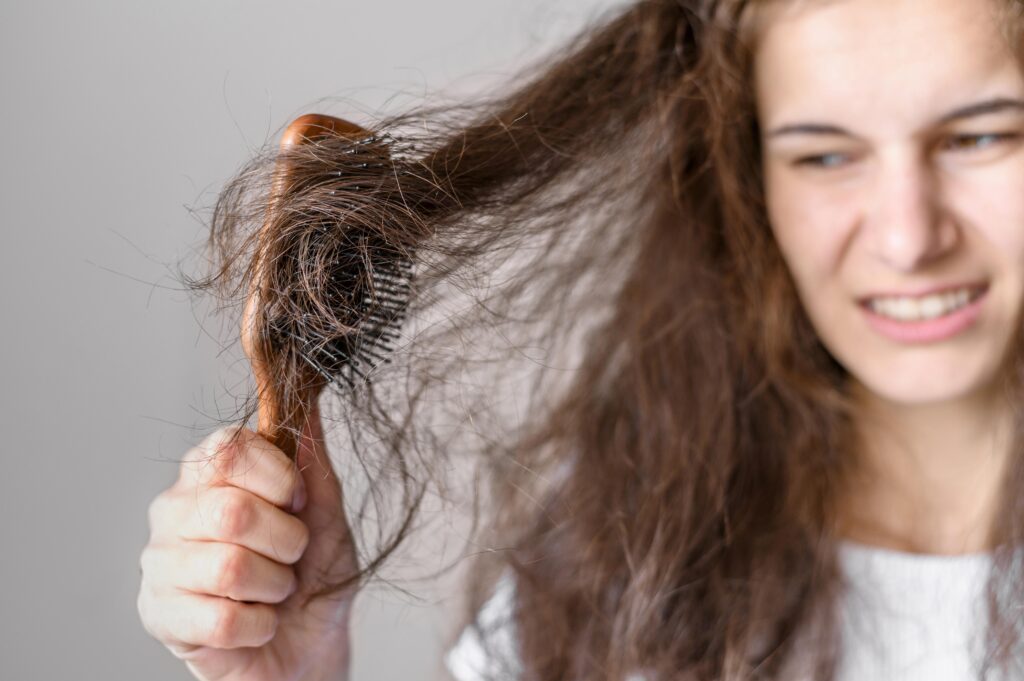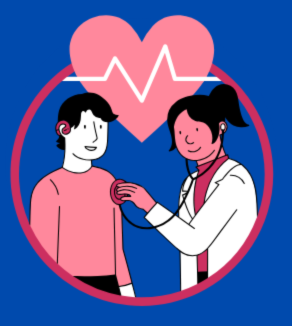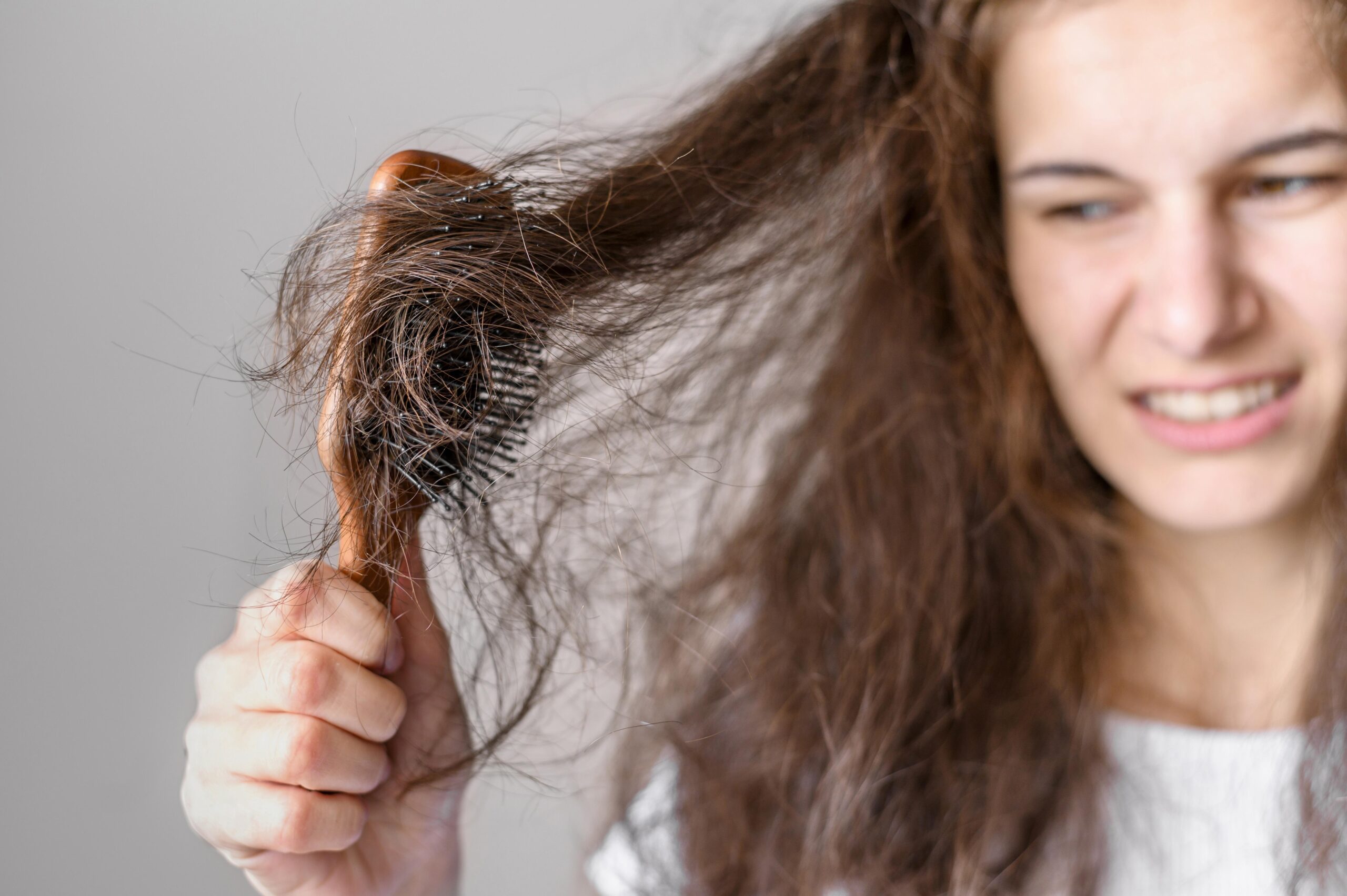Hair loss is a common concern that affects people of all ages and genders. whether your noticing a few extra strands in the shower drain or experiencing significant hair fall. its essential to understand what can cause hair loss and explore effective strategies tackle this issue.

IDENTIFYING THE CAUSES OF HAIR FALL:
- GENETICS
- HORMONAL CHANGES
- NUTRITIONAL DEFICIENCY
- STRESS AND LIFESTYLE FACTOR
- WEATHER AND POLLUTION
- CHILDBIRTH
Hair fall is associated with all of these factors. Let’s focus on each aspect in more depth.
GENETICS :
An important factor in hair loss is family history. If your parents or grandparents experienced hair loss, with the condition known as androgenetic alopecia( AGA) being the most common genetic cause.
Knowing one’s genetic predisposition and family history can help inform preventive or therapeutic decisions and offer important insights into one’s likelihood of developing hair loss.
HORMONAL CHANGES
Hormonal fluctuations have a major effect on hair loss, and the regulation of the hair growth cycle is largely dependent on a number of important hormones. Dihydrotestosterone (DHT), which is derived from testosterone,is one of the main hormones associated with hair loss.
Thyroxine (T4) and triiodothyroxine (T3) are two thyroid hormones that are essential for hair growth. Hair thinning or loss may arise from disturbances to the normal hair growth cycle caused by hypo- or hyperthyroidism. sustaining healthy hair requires a functioning thyroid.
NUTRITIONAL DEFICIENCY
Hair follicles need a range of nutrients to stay healthy and perform as intended, so nutritional deficits may contribute to hair loss.
In order to prevent hair fall, several essential nutrients like Iron,Vitamins, proteins, zinc,copper etc., are especially crucial.
STRESS AND LIFESTYLE
High stress levels ,poor sleep and unhealthy lifestyle can adversely affect on your hair loss. Maintaining healthy hair in the face of stress and lifestyle factors requires a number of key strategies, including practising stress management techniques like mindfulness, exercise,and meditation; eating a diet high in nutrients; getting enough sleep and choosing your hairstyle with consideration.
Getting professional assistance can help identify specific causes and suitable interventions if hair fall persists.
WEATHER AND POLLUTION
Exposure to environmental pollutants and harsh chemicals can damage the hair shaft, weaken the follicles, and contribute to hair loss over time.
Taking steps to minimise exposure to harsh environmental factors and using protective measures, such as wearing hats, can help prevent environmental damage to the hair
CHILDBIRTH
Hair loss after childbirth is often attributed to hormonal fluctuations. Increased levels of oestrogen prolong the growth phase of hair during pregnancy, resulting in fuller, thicker hair. But following childbirth, hormonal levels fall, the hair goes into a resting phase, and eventually it sheds.
This shedding known as telogen effluvium,typically occurs 2-4 months postpartum.
Effective Prevention and Maintenance
1.BALANCED DIET
Consume a diet rich in proteins, vitamins (especially vitamin A and E) and minerals like iron and zinc. These nutrients are crucial for healthy hair growth.
2.SCALP CARE
Keep your scalp clean and nourished use a mild shampoo and conditioner suitable for your hair type, and avoid excessive use of styling products.
3.REGULAR EXERCISE
Physical activity improves blood circulation, promoting hair health. For general health, make regular exercise a part of your schedule or routine.
4.AVOID HARSH TREATMENTS
Limit the use of heat styling tools,chemical treatments and tight hairstyles, as they can damage hair follicles and lead to increased hair fall.
HOME REMEDIES FOR HAIR LOSS
1) NATURAL OILS :
Applying oils like coconut, almond or castor oil can provide nourishment to the hair and scalp massage gently and leave overnight before washing.
2) ALOEVERA :
Aloevera has soothing properties and can be applied to the scalp to promote a healthy environment for hair growth.
Some yoga exercises can help to reduce hair fall. Daily hair routine is also help to reduce hair loss as follow
GENTLE CLEANING :
Wash your hair with a mild sulphate free shampoo. Focus on the scalp to remove any accumulated oils and products residue.
CONDITIONING :
Coat the lengths and ends of your hair with a conditioner. Leave it on for the recommended time and then rinse thoroughly. Use a wide tooth comb to untangle hair gently.
TOWEL DRYING :
Pat your hair with a soft towel to avoid roughening the hair cuticle. Avoid vigorous rubbing, as wet hair is more prone to breakage.
PRECAUTION
AVOID EXCESSIVE TOUCHING :
Try to minimise touching your hair throughout the day, as this can transfer oils and dirt from your hands to your hair.
PROTECT FROM ENVIRONMENTAL FACTORS :
If exposed to harsh sunlight, wind or pollution, consider protecting your hair with hat or scarf.
NIGHT TIME ROUTINE :-
PRE-BEDTIME BRUSHING :
Gentle brush your hair to remove any tangles.
LOOSE HAIR STYLE :
If possible, sleep with your hair in a loose braid or ponytail to prevent friction and tangling. This can also prevent hair loss.
CONCLUSION:
In conclusion, effective management and prevention of hair loss depend on an understanding what can cause hair loss to the condition. Healthy hair is clearly a reflection of our overall health, from nutritional deficiencies, stress, and harsh styling techniques to environmental factors and hormonal imbalances.
Seeking advice from medical professionals can help achieve a head of hair that not only complements a healthy balanced body but also looks great.
FAQ
How to reduce hair loss in female naturally ?
Reducing hair loss in females naturally involves adopting healthy lifestyle practices, avoid harsh chemicals, scalp massage, gentle hair care, and balanced diet.
Reasons for hair loss in women ?
Hair fall reasons :
- Thyroid Disease
- Hereditary Hair Loss
- Stress
- Hormonal changes
- Certain Medications
What is remedy for hair loss?
Natural oils and aloevera is best remedy for hair fall.
Use organic shampoo or sulphate free shampoo to avoid hair loss.


I just like the helpful information you provide in your articles
Thank you